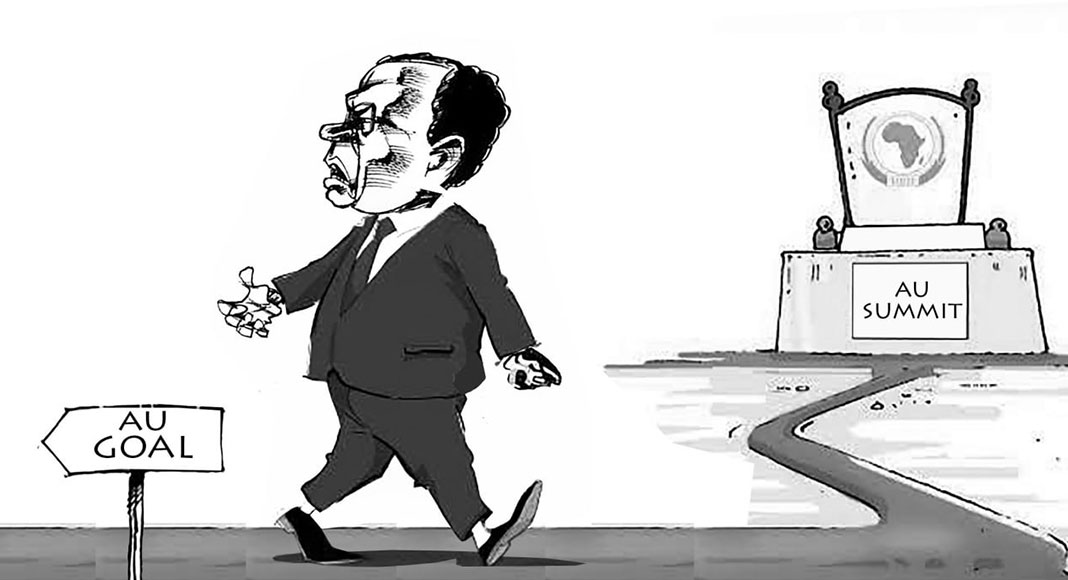
As African leaders flock to Addis Ababa this weekend for their ritual gathering to take part in the 38th Ordinary Session of the Assembly of Heads of State and Government of the African Union (AU), they are certain to trot out the usual platitudes about how they are determined to address the critical issues shaping the continent’s future. True, the summit represents an opportunity for the leaders to tackle the plethora of perennial challenges facing Africa through the AU. While interminable conflicts, bad governance, weak institutions, electoral irregularities and widespread corruption continue to blight Africa’s political landscape, high levels of poverty, food insecurity, inadequate access to basic services, limited infrastructure, lack of job opportunities as well as the impacts of climate change, including droughts and floods, pose significant threats to the well-being and livelihoods of the vast majority of African populations. It is against this backdrop that the leaders must take it up on themselves to enable the AU to duly carry out the solemn responsibilities entrusted to it.
The AU was established with a bold vision: to propel Africa towards greater unity, peace, and prosperity. Its core mission rests on addressing the continent’s most pressing challenges, from conflict resolution and governance deficits to economic integration and sustainable development. However, nearly two decades since its inception, it remains unable to fully realize its lofty mission. A crucial factor explaining this shortcoming is the lack of sufficient empowerment of the AU Commission (AUC), the executive arm of the Union, and the inconsistent political will demonstrated by African heads of state and government to support its mandate. If Africa is to achieve its aspirations as set out in Agenda 2063, it is imperative to strengthen the AUC and ensure that member states demonstrate an unwavering commitment to its mission.
The AUC is the engine room of the AU. It is tasked with implementing the decisions of the AU Assembly, managing the day-to-day operations of the Union, and driving the continent’s development agenda. From promoting peace and security through the African Peace and Security Architecture (APSA) to advancing economic integration via the African Continental Free Trade Area (AfCFTA), the Commission plays a pivotal role in translating the AU’s goals into tangible outcomes. However, structural and political challenges have hampered its effectiveness. It is underfunded, understaffed, and frequently undermined by the very member states it serves. Although the AU’s founding principles emphasize the importance of collective action and shared responsibility, many African leaders have been reluctant to give the AUC the necessary authority and resources. This has created a paradox: a continental body tasked with addressing transnational challenges is intentionally or otherwise left powerless to act decisively.
One of the most glaring manifestations of this lack of empowerment is the AU’s chronic funding crisis. Despite repeated commitments to self-reliance, the AU is still heavily dependent on external donors, who finance a significant portion of its budget. This reliance undermines the Union’s autonomy and exposes it to the risk of external influence. In 2016, African leaders adopted the landmark decision to finance the entirety of the AU’s operational budget and 75 percent of its program budget through member state contributions. However, implementation has been sluggish, with many countries failing to meet their financial obligations. This funding shortfall is not merely a logistical issue; it is a reflection of the limited political will among African leaders to attach importance to the AU’s mission. Member states are thus effectively signaling that they do not view the AU as a critical vehicle for advancing their collective interests. This undermines the AUC’s ability to execute its mandate and perpetuates a cycle of dependency and inefficiency.
Empowering the AUC requires a multi-faceted approach. First and foremost, member states must honor their financial commitments and ensure that the Commission has the resources it needs to function effectively. Beyond funding, the Commission must be granted greater autonomy to carry out its mandate. This encompasses streamlining decision-making processes to reduce bureaucratic bottlenecks and enhancing its capacity to mediate conflicts, implement development programs, and enforce AU decisions. Ultimately, though, the success of the AUC hinges on the political will of African heads of state and government. While many leaders have publicly endorsed the AU’s vision, their actions tell a different story. Too often, national interests take precedence over continental priorities, and commitments made at AU summits are not followed through at the national level. This incongruity between rhetoric and action undermines the credibility of the AU and weakens its ability to drive change.
The vision of a united, prosperous, and peaceful Africa is within reach. However, realizing this vision requires more than just words; it requires action. African leaders need to empower the AU Commission if it is to unlock the full potential of the Union and set the continent on a path towards sustainable development and shared prosperity. The time to act is now. Africa’s future depends on it.
.
.
.
#Empowering #AUC #Prerequisite #Africas #Progress
Source link











